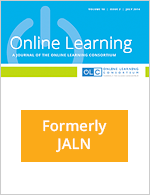Are Online Courses Cannibalizing Students From Existing Courses?
One of the reasons most often cited for the increasing number and popularity of online courses is the format's ability to provide access to students who cannot attend conventionally delivered face-to-face courses. Are these underserved students in fact the ones enrolling in online courses? Or are online course enrollees the...

